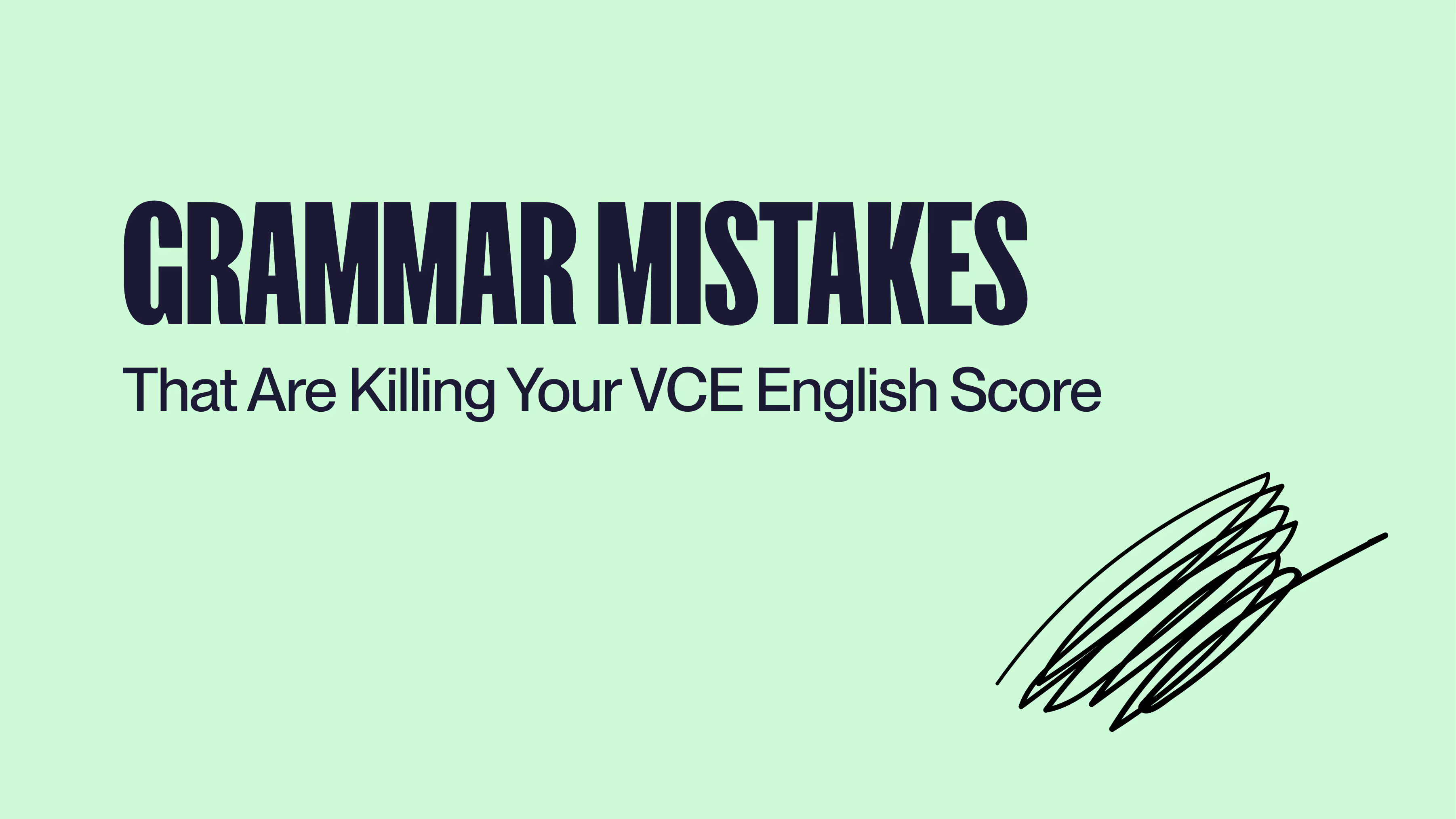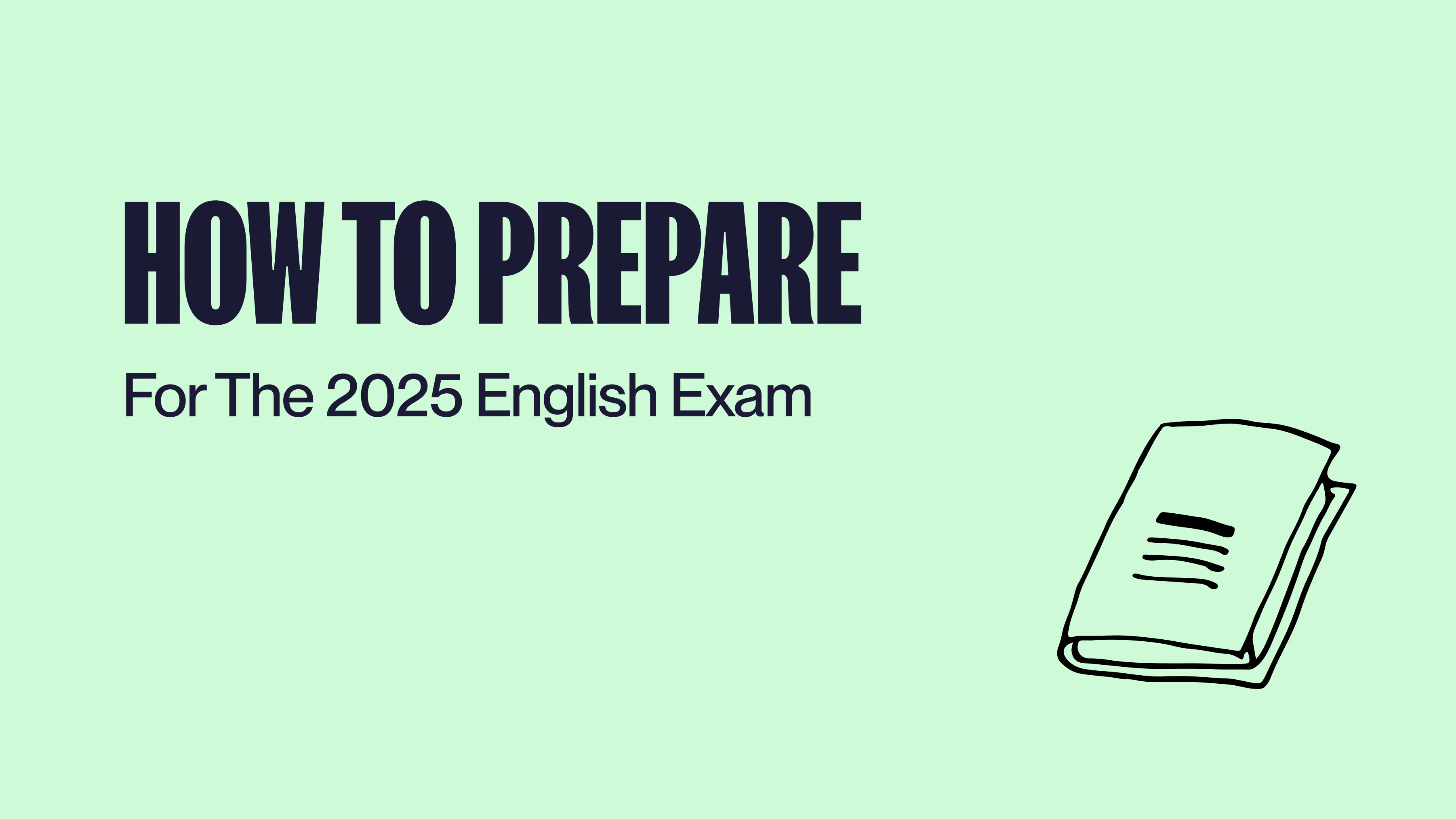
Grammar Mistakes That Are Killing Your VCE English Score (And How to Fix Them)
When you’re knee-deep in analysing how the author’s use of metalepsis reflects the protagonist’s existential crisis, grammar is probably the last thing on your mind. Fair enough! But here’s a truth bomb: those pesky grammar details can be the difference between your essay being merely good and absolutely brilliant.
Enter, VCAA’s performance descriptors:
“Develops a cogent, controlled and well-substantiated discussion using precise and expressive language”
We’ve seen countless essays with insightful analysis that get completely undermined by simple grammar mistakes. VCAA examiners are like grammar detectives with a vendetta – they will find your mistakes, and they will dock your marks.
So let’s tackle these linguistic landmines before they make it to your SACs and exam responses.
Error #1: Their, They’re, There
Yes, we’re starting with this one. No, it’s not beneath you. Even our RAW-50 students sometimes commit this grammatical sin when writing under pressure.
- Their shows possession, like “their analysis” or “their excessive highlighting habit.”
- There points to a location or existence, like “there are several metaphors” or “there goes my weekend, spent analyzing poetry.”
- They’re is just “they are” with a fancy hat (apostrophe), like “they’re demonstrating sophisticated writing skills” or “they’re definitely going to test us on this text.”
Getting these wrong is like wearing mismatched socks to a job interview – people notice, and they judge silently.
Error #2: Its vs. It’s
Meet the apostrophe that launches a thousand ships. This tiny punctuation mark has caused more academic heartbreak than any school formal ever could.
- It’s means “it is” or “it has.” It’s obvious the author has trust issues with semicolons.
- Its shows possession. The essay lost its coherence around paragraph four, much like I lost my will to live during exam week.
Think of the apostrophe as a little flag saying “letters are missing here!” No missing letters? No apostrophe needed.
Error #3: Your vs. You’re
It’s like telling your English teacher you think Shakespeare’s best work was “Harry Potter.”
- Your shows possession. Your interpretation is as unique as your fingerprint, but hopefully more coherent.
- You’re means “you are.” You’re developing an argument almost as impressive as your ability to function on four hours of sleep.
When you mix these up, somewhere an English teacher feels a disturbance in the force and doesn’t know why.
Error #4: Then vs. Than
Than is for comparisons. Her analysis is more nuanced than mine, which isn’t saying much after I spent last night binge-watching Netflix instead of studying.
Then is for sequences or consequences. First analyze the quote, then connect it to your thesis, then pray the examiner is in a good mood.
Error #5: Affect vs. Effect
The twins separated at birth, this pair confuses even the best of us, probably because they sound almost identical when you’re muttering them desperately during an all-night study session.
- Affect is (almost always) a verb – an action. The author’s language choices affect readers the way caffeine affects my ability to form coherent sentences at 2 AM.
- Effect is typically a noun – a result. The effect of this metaphor is powerful, unlike the effect of my last-minute cramming.
Remember it this way: You Affect something to create an Effect. The A comes before the E, both alphabetically and causally.
Error #6: That vs. Which vs. Witch
Unless you’re analysing Macbeth or The Crucible, you probably only need to worry about the first two:
- That introduces essential information. The essay that scored 50 used sophisticated language, unlike mine that reads like it was written by a sleep-deprived gremlin.
- Which adds bonus details that could be removed. The novel, which won several awards that I’m definitely not jealous of, explores identity.
- And witch? Well, that’s what you’ll be calling your English teacher when they assign another text analysis due Monday.
Why this matters more than you think
The difference between a 45 and a 50 often comes down to precision. When your grammar is on point, examiners can focus entirely on your brilliant analysis rather than being distracted by preventable errors that scream “I finished this at 3 AM!”
Our top 1% students aren’t just idea machines – they’re precise writers. That doesn’t mean they were born with a style guide in hand; it means they practiced until these distinctions became second nature.
Because practice doesn’t make perfect. Perfect practice does. Start catching these distinctions in your writing now, and by the time exams roll around, you’ll have one less thing keeping you awake at night (don’t worry, pre-exam anxiety will fill that void nicely).
Want to see what grammatical precision looks like when it’s not just being preached but actually practiced? You may want to check out our on-demand help. Because sometimes seeing the difference is faster than having it explained to you for the fifteenth time by your well-meaning but slightly exasperated English teacher.



